Astrophysics news archive: 2009-2022
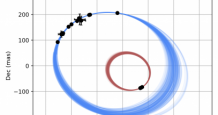
Gaia helps discover directly imaged planet undergoing nuclear fusion
Scientists have used the subtle movements of a distant star to help discover a new exoplanet – which is displaying signs of undergoing nuclear fusion in its core.
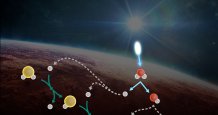
Scientists unravel mysteries of exoplanet atmosphere
Scientists using NASA’s James Webb Space Telescope have secured a major breakthrough in the quest to unravel the mysteries of the atmospheres of distant planets – a molecular and chemical profile of the exoplanet WASP-39b.
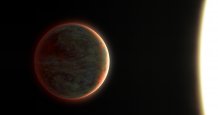
Hubble detects exotic water cycle and metal clouds in a hot Jupiter exoplanet atmosphere
Scientists have explored the nightside hemisphere of an enormous planet, far outside our solar system for the first time – revealing metal clouds and rain made of liquid gems.
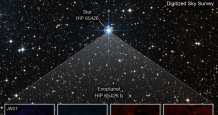
First exoplanet image from James Webb Space Telescope revealed
Astronomers from the University of Exeter have led the effort to capture the first-ever direct image of an exoplanet using the pioneering James Webb Space Telescope.

Budding space enthusiasts can become "Exoplanet Explorers" in new online game
Aspiring astronomers and budding young space enthusiasts are set to be given a unique opportunity to hunt for distant planets far outside our solar system, thanks to a cutting-edge, interactive new online game.
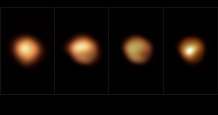
Mystery behind the “Great Dimming” of the Betelgeuse star solved
The quest to discover what lay behind the “great dimming” of the aging star Betelgeuse, normally one of the brightest stars on the night sky, has taken a new, fascinating twist.
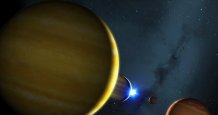
Star’s death will play a mean pinball with rhythmic planets
Four planets locked in a perfect rhythm around a nearby star are destined to be pinballed around their solar system when their sun eventually dies, according to a new study that peers into its future.

University of Exeter student awarded grant to study exoplanet climates
University of Exeter astrophysics student Mei Ting Mak has been awarded one of this year’s prestigious grants from the Bell Burnell Graduate Scholarship Fund.
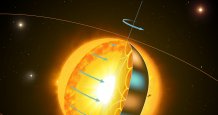
The science of spin - older stars rotate faster than expected
Stars spin faster than expected as they age, according to a new study - which uses asteroseismology to shed new light on this emerging theory
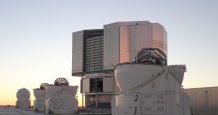
University of Exeter joins Europe’s largest astronomy network
The University of Exeter is joining Europe’s largest, ground-based astronomy collaborative network, it has been announced.
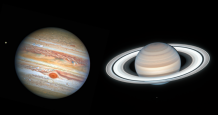
Stargazers given once in-a-lifetime opportunity to see ‘Great Conjunction’ of Saturn and Jupiter
Budding astronomers will be given a once-in-a-lifetime opportunity to witness a truly special celestial event in the run-in to Christmas.

ERC-funded project to explore the origin of diversity in star and planetary systems
One of the University of Exeter’s most distinguished astrophysics researchers has received a significant funding boost from the European Research Council (ERC), it has been announced.
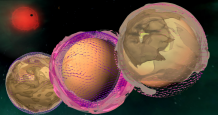
Astronomy expert secure prestigious national fellowship
One of the University of Exeter’s most prominent astrophysics experts has received a prestigious national fellowship, it has been announced.
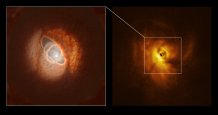
Scientists discover a warped disc “torn apart by stars” in a triple Tatooine-like system
Pioneering new research has revealed the first direct evidence that groups of stars can tear apart their planet-forming disc, leaving it warped and with tilted rings.

Exeter Astrophysics expert awarded prestigious international prize
Professor Isabelle Baraffe, a leading expert in astrophysics research, has been awarded a prestigious international science prize.
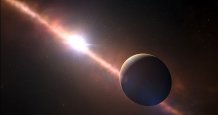
First measurement of spin-orbit alignment on planet Beta Pictoris b
Astronomers have made the first measurement of spin-orbit alignment for a distant ‘super-Jupiter’ planet.

Presence of airborne dust could signify increased habitability of distant planets, research shows
Scientists have expanded our understanding of potentially habitable planets orbiting distant stars by including a critical climate component – the presence of airborne dust.

Pioneering new ‘smart needle’ could revolutionise cancer diagnosis
Scientists have developed a pioneering new technique that can detect and diagnose one of the most common types of cancer within seconds - using light.

Pupils given ‘out of this world’ virtual tour of exoplanets
Schoolchildren are being given an ‘out of this world’ opportunity to explore distant worlds discovered and studied by astronomers and climate scientists– all from the comfort of their classroom.

Exeter experts awarded prestigious Institute of Physics medals
Two physicists from the University of Exeter have received prestigious national awards in recognition of their long-standing, pioneering research.

Funding boosts Exeter’s research into the building blocks of galaxies
An Astrophysics expert from the University of Exeter has been awarded substantial funding to help solve one the most fundamental riddles of modern astronomy.
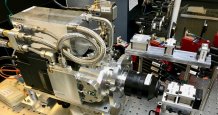
Pioneering infrared imager gives sharpest-ever view of stars and planet-forming discs
A pioneering new instrument could give astronomers a glimpse into how the solar system looked more than 4.5 billion years ago.
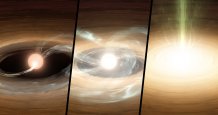
Newly discovered adolescent star seen undergoing ‘growth spurt’
Astronomers have discovered a young star undergoing a rare growth spurt – giving a fascinating glimpse into the development of these distant stellar objects.

Scientists take first tentative steps to explore potential climate of Proxima B
The quest to discover whether a planet orbiting our closest neighbouring star, Proxima Centauri, has the potential to support life has taken a new, exhilarating twist.
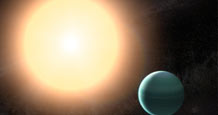
Primitive atmosphere discovered around ‘Warm Neptune’
A pioneering new study uncovering the ‘primitive atmosphere’ surrounding a distant world could provide a pivotal breakthrough in the search to how planets form and develop in far-flung galaxies.
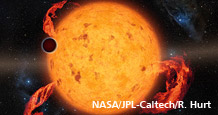
Discovery of newborn exoplanet could help explain planetary evolution
A team of international researchers have discovered the youngest fully-formed exoplanet ever detected, orbiting a young star 500 light years from Earth.

Exeter space experts join astronaut Tim Peake in school project
Researchers from the University of Exeter are taking part in a school project which will feature a live space hook up with the astronaut Tim Peake on the International Space Station (ISS).

University of Exeter student crowned as ‘3 Minute Wonder’
A University of Exeter student has won a prestigious national competition designed to promote the pioneering work being carried out by early-career scientists to a wider audience.

Heritage of Earth’s water gives rise to hopes of life on other planets
A pioneering new study has shown that water found on Earth predates the formation of the sun – raising hopes that life could exist on exoplanets, the planets orbiting other stars in our galaxy.

£5 million to expand knowledge on human health, life and space
Grants totalling more than £5 million will allow world-class researchers at the University of Exeter to push the boundaries of knowledge in ground-breaking five year projects.
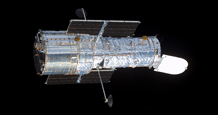
Dramatic change spotted on a faraway planet
A University of Exeter scientist is part of a team of astronomers that has seen dramatic changes in the upper atmosphere of a faraway planet, using the NASA/ESA Hubble Space Telescope.
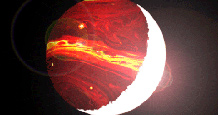
Exeter team to adapt weather forecasting for Exoplanets
A University of Exeter team is adapting the UK Met Office’s weather and climate model to study the atmospheric properties of planets orbiting other stars.

What do sunsets look like from other planets?
A University of Exeter astrophysicist has shown what sunsets look like on planets outside our solar system.

From Exeter to Benin – physics communicator takes the prize
A University of Exeter astrophysicist and a Cardiff-based Research Engineer for EADS have won the Institute of Physics’ (IOP) inaugural Early Career Communicators’ Award for the inspirational activities they have undertaken to introduce a diverse range of people to the wonders of physics.
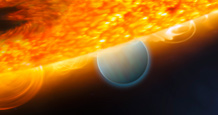
International team to use Hubble Space Telescope to answer key astronomy questions
An international team of scientists led by the University of Exeter is aiming to answer some of the biggest questions facing astronomy today.

Exeter astrophysicist awarded prestigious medal
A University of Exeter professor who is one of the world’s leading experts in studying distant planets has been honoured by the Royal Astronomical Society (RAS) for his outstanding work.

Exeter astrophysicist honoured with top prize
An expert in studying distant planets at the University of Exeter has been awarded the highest prize for physics in France.
Breakthrough in the study of distant planet atmospheres
A research team led by the University of Exeter has discovered a previously undetected element in the atmosphere of a planet almost 500 light years from Earth.
Turning the spotlight on exoclimates
Some of the world’s leading experts in studying these far-off worlds, known as exoplanets, are heading to the University of Exeter for a conference to discuss the latest findings in this rapidly developing area of research.
Exeter astronomer wins international award for planet discovery
A discovery by a team including a scientist from the University of Exeter has won the 2009 Newcomb Cleveland Prize of the American Association for the Advancement of Science (AAAS).
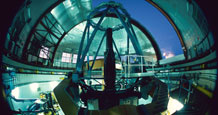
Exeter scientists help discover most distant cosmic explosion ever seen
Astrophysicists from the University of Exeter are involved in the discovery of the most distant cosmic explosion ever seen.
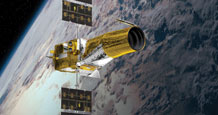
European team finds smallest transiting extrasolar planet ever
The CoRoT satellite has discovered a planet only twice as large as the Earth orbiting a star slightly smaller than the Sun.
